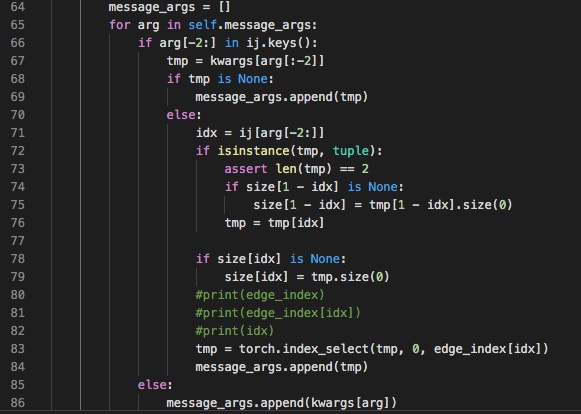Hi everyone, I am trying to train a graph neural network on a PPI dataset. The code below shows a part of a code that passes messages from neighboring nodes through connecting edges. I get Type error as shown in the image below when I run this code through an import from the main program. From the error message, the error is from line 83, specifically "edge_index[idx] which returns a “none” instead of an element corresponding to an idx value in the array. But when I print the “idx”, it returns “1” so it should probably return index 1 element from the edge_index array but returns a “none” instead which throws an error. See attached the images.

What were the print statements returning in the iteration before this error is raised?
Did you make sure that edge_index[idx] returned a valid tensor? If so, could you post an executable code snippet to reproduce this issue?
@ptrblck, the results for the print statements are shown in the image below. The tensor is the edge_index tuple with size “none”, “idx” prints “1” and edge_index[idx] prints a “none”.
With the posting of executable code to reproduce the issue, that will be a lot of code files to post because I’m running the main program which import a lot of different python files to execute including this message passing code. Probably I can post the full message passing code so that you can have a look.

Here is the full message passing code:
import inspect
import torch
from torch_geometric.utils import scatter_
class MessagePassing(torch.nn.Module):
def init(self, aggr=‘add’, flow=‘source_to_target’):
super(MessagePassing, self).init()
self.aggr = aggr
assert self.aggr in ['add', 'mean', 'max']
self.flow = flow
assert self.flow in ['source_to_target', 'target_to_source']
self.message_args = inspect.getargspec(self.message)[0][1:]
self.update_args = inspect.getargspec(self.update)[0][2:]
def propagate(self, edge_index, size=None, **kwargs):
r"""The initial call to start propagating messages.
Args:
edge_index (Tensor): The indices of a general (sparse) assignment
matrix with shape :obj:`[N, M]` (can be directed or
undirected).
size (list or tuple, optional): The size :obj:`[N, M]` of the
assignment matrix. If set to :obj:`None`, the size is tried to
get automatically inferrred. (default: :obj:`None`)
**kwargs: Any additional data which is needed to construct messages
and to update node embeddings.
"""
size = [None, None] if size is None else list(size)
assert len(size) == 2
kwargs['edge_index'] = edge_index
i, j = (0, 1) if self.flow == 'target_to_source' else (1, 0)
ij = {"_i": i, "_j": j}
message_args = []
for arg in self.message_args:
if arg[-2:] in ij.keys():
tmp = kwargs[arg[:-2]]
if tmp is None:
message_args.append(tmp)
else:
idx = ij[arg[-2:]]
if isinstance(tmp, tuple):
assert len(tmp) == 2
if size[1 - idx] is None:
size[1 - idx] = tmp[1 - idx].size(0)
tmp = tmp[idx]
if size[idx] is None:
size[idx] = tmp.size(0)
#print(edge_index)
#print(edge_index[idx])
#print(idx)
tmp = torch.index_select(tmp, 0, edge_index[idx])
message_args.append(tmp)
else:
message_args.append(kwargs[arg])
size[0] = size[1] if size[0] is None else size[0]
size[1] = size[0] if size[1] is None else size[1]
kwargs['size'] = size
update_args = [kwargs[arg] for arg in self.update_args]
out = self.message(*message_args)
if self.aggr in ["add", "mean", "max"]:
out = scatter_(self.aggr, out, edge_index[i], dim_size=size[i])
else:
pass
out = self.update(out, *update_args)
return out
def message(self, x_j): # pragma: no cover
return x_j
def update(self, aggr_out): # pragma: no cover
return aggr_out
Based on the posted outputs it seems edge_index is a tuple containing a tensor and None.
If idx is set to 1, you would index the tuple and get the None value as the return value.
I’m not sure what the None represents, but in case you want to index the stored tensor, you would have to use edge_index[0][idx].
After changing it to edge_index[0][idx] which I agree, I got an error which says “Index tensor must have the same number of dimensions as self tensor” as shown in the image. From the printed output, the edge_index[0][idx] which is the index in the index_select module returns a flattened tensor, whilst that of the edge_index tensor is a tuple with a “tensor” and size “none”, thus throwing an error that the two tensors have unequal dimensions. The None represents the size the of the edge_index tensor. You can probably have a look at the full message passing code I attached in my previous message to see how the edge_index tensor was created.





